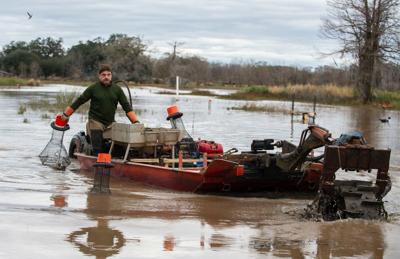Recreational crawfishers in Louisiana may see a new requirement in the months ahead as the state seeks to cut down on the number of abandoned traps.
A proposed change endorsed by the state’s Wildlife and Fisheries Commission would reinstate an old rule requiring recreational crawfishers to tag their traps with their fishing license numbers. The rule would only apply to traps and not nets, which is how many weekend crawfishers coax the crustaceans toward their boiling pots.
Nets do not tend to be abandoned the way traps are. The proposed rule would not apply to commercial crawfishers, who usually operate within crawfish farms.
“The rule intends to decrease litter, provide accountability for passive gear, and reduce ‘ghost-fishing,’” the Department of Wildlife and Fisheries said in a statement, using the term for abandoned traps that continue to catch crawfish that then die inside them.
A similar requirement used to be in effect, but was inadvertently removed when the department restructured licensing a few years back, said spokesperson Rene LeBreton. Tags must be waterproof and attached directly to the device or an attached buoy.
It’s not clear how many people crawfish recreationally in Louisiana, since a basic fishing license is all that's needed.
Abandoned traps have long been a problem, particularly for crabs. The state holds regular “crab trap rodeos” when volunteers and department members collect abandoned traps in designated areas. It also periodically closes areas to clear abandoned traps.
Since the crab-trap removal program began two decades ago, more than 55,000 derelict and abandoned traps have been collected. A 2020 study estimated that each trap kills 26 crabs and eight fish per year through “ghost fishing.”
Similar data was not available for crawfish.
Public comments on the proposed rule can be submitted before July 30 to Robby Maxwell, Department of Wildlife and Fisheries, 1025 Tom Watson Rd., Lake Charles, LA 70615, or via email to rmaxwell@wlf.la.gov.
An oversight committee in the state Legislature will later have an opportunity to approve or reject the proposal before it becomes final.

